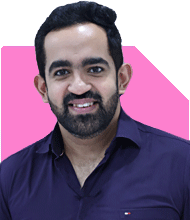Ramalingam Kalirajan |8093 Answers |Ask -Follow
Mutual Funds, Financial Planning Expert - Answered on Jul 08, 2024
He has an MBA in finance from the University of Madras and is a certified financial planner.
He is the director and chief financial planner at Holistic Investment, a Chennai-based firm that offers financial planning and wealth management advice.... more

I am 45 yr old male with monthly salary of 2 Lacs. I have rental income of 30000 rupees, PPF: 20 Lacs(static no investmenteffective 2024), Pf: 35 Lacs, NPS: 10 Lacs (yearly 1lac inr being deposited), MF: 10Lacs ( montly 40000 being invested) Goal is to retire at 55 with monthly income of 1Lac inr. Suggest corpus and way to achieve. Please avoid AI scripted response.
You earn Rs. 2 lakhs monthly and have rental income of Rs. 30,000.
Your investments are diversified across PPF, PF, NPS, and mutual funds.
Assessing Current Investments
Public Provident Fund (PPF)
You have Rs. 20 lakhs in PPF, a secure long-term investment with tax benefits.
PPF offers stable, low-risk returns and is exempt from tax.
Provident Fund (PF)
Your PF balance is Rs. 35 lakhs.
PF provides steady growth and tax benefits, ideal for retirement savings.
National Pension System (NPS)
With Rs. 10 lakhs in NPS and Rs. 1 lakh added annually, you're on track for retirement.
NPS is a mix of equity and debt, providing growth and stability.
Mutual Funds
You have Rs. 10 lakhs in mutual funds and invest Rs. 40,000 monthly.
Mutual funds offer diversification, growth potential, and compounding benefits.
Setting Retirement Goals
Monthly Income Post-Retirement
You aim for a monthly income of Rs. 1 lakh post-retirement.
To achieve this, we need to build a substantial retirement corpus.
Calculating the Required Corpus
Understanding Inflation
Consider inflation to maintain your purchasing power.
Assume an inflation rate of 6-7% per year.
Estimating Retirement Corpus
You need a corpus that generates Rs. 1 lakh monthly.
This requires a mix of growth and income-generating investments.
Strategic Investment Planning
Enhancing Mutual Fund Investments
Equity Mutual Funds
Continue investing in equity mutual funds for long-term growth.
Equity funds have higher returns, though they come with higher risk.
Debt Mutual Funds
Include debt mutual funds for stability and capital preservation.
Debt funds offer lower returns but are less volatile.
Hybrid Funds
Hybrid funds balance equity and debt, providing moderate returns and lower risk.
They are suitable for medium-term goals and risk-averse investors.
Power of Compounding
Compounding in Mutual Funds
Reinvesting returns generates additional returns, exponentially growing your wealth.
The power of compounding is maximized with early and consistent investments.
Benefits of Actively Managed Funds
Expert Management
Actively managed funds have professional fund managers making informed investment decisions.
Potential for Higher Returns
Active funds aim to outperform the market, providing potentially higher returns.
Flexibility in Asset Allocation
Fund managers can adjust asset allocation based on market conditions, protecting investments during downturns.
Disadvantages of Index Funds
Lack of Flexibility
Index funds strictly follow an index and cannot adjust to market changes.
Average Returns
Index funds aim to match the market, providing average returns.
Lower Potential for Risk Management
Index funds are fully exposed to market volatility and lack active risk management.
Benefits of Investing Through a Certified Financial Planner (CFP)
Personalized Financial Planning
A CFP provides personalized strategies based on your goals and risk tolerance.
Professional Guidance
CFPs offer expert advice and help navigate market complexities.
Regular Monitoring and Rebalancing
CFPs monitor your investments and rebalance the portfolio to maintain the desired asset allocation.
Better Investment Decisions
With a CFP, you make informed investment decisions backed by professional research and analysis.
Diversifying Your Portfolio
Equity Investments
Equity investments offer high returns but come with higher risk.
Invest in a mix of large-cap, mid-cap, and small-cap funds for diversification.
Debt Investments
Debt investments provide stability and preserve capital.
Invest in government securities, corporate bonds, and debt mutual funds.
Balanced Approach
A balanced approach with equity and debt investments reduces risk and provides stable returns.
Building a Retirement Corpus
Consistent Investments
Continue your Rs. 40,000 monthly investment in mutual funds.
Increase the amount if possible to accelerate corpus growth.
Regular Review and Adjustment
Regularly review and adjust your investment portfolio based on performance and changing goals.
This ensures alignment with long-term objectives.
Importance of an Emergency Fund
Building an Emergency Fund
Keep at least 6 months' worth of expenses in an emergency fund.
Invest in liquid assets like savings accounts or debt funds for quick access.
This ensures you're prepared for any financial emergencies.
Maximizing Tax Efficiency
Tax-Advantaged Investments
Utilize tax-saving instruments like ELSS (Equity Linked Savings Scheme) for mutual funds.
They offer tax benefits under Section 80C, reducing taxable income.
Efficient Tax Management
Plan your investments to maximize tax benefits.
Use instruments like PPF, NPS, and NSC for efficient tax management.
Long-Term Financial Security
Sustainable Income Post-Retirement
Ensure that investments generate a sustainable income post-retirement.
Focus on a mix of growth-oriented and stable investments.
Inflation Protection
Investments should grow faster than inflation to maintain purchasing power.
Equity funds can provide the necessary growth to beat inflation.
Final Insights
Your financial journey is on a solid path.
Continue investing in mutual funds and other instruments for a secure future.
Focus on diversification, compounding, and tax efficiency.
Maintain an emergency fund for financial security.
Utilize the expertise of a Certified Financial Planner for personalized guidance.
With consistent effort and strategic planning, you can achieve a comfortable and secure retirement.
Best Regards,
K. Ramalingam, MBA, CFP,
Chief Financial Planner,
www.holisticinvestment.in
You may like to see similar questions and answers below
Ramalingam Kalirajan |8093 Answers |Ask -Follow
Mutual Funds, Financial Planning Expert - Answered on Jul 25, 2024
Anil Rego |388 Answers |Ask -Follow
Financial Planner - Answered on Jul 31, 2024
Ramalingam Kalirajan |8093 Answers |Ask -Follow
Mutual Funds, Financial Planning Expert - Answered on Jan 28, 2025
Ramalingam Kalirajan |8093 Answers |Ask -Follow
Mutual Funds, Financial Planning Expert - Answered on Feb 07, 2025
Inderpaul Singh |47 Answers |Ask -Follow
Leadership Coach - Answered on Mar 12, 2025
T S Khurana |398 Answers |Ask -Follow
Tax Expert - Answered on Mar 12, 2025
T S Khurana |398 Answers |Ask -Follow
Tax Expert - Answered on Mar 12, 2025
Rajesh Kumar Singh |192 Answers |Ask -Follow
IIT-JEE, GATE Expert - Answered on Mar 12, 2025
T S Khurana |398 Answers |Ask -Follow
Tax Expert - Answered on Mar 12, 2025
Aamish Dhingra |14 Answers |Ask -Follow
Life Coach - Answered on Mar 12, 2025
Kanchan Rai |554 Answers |Ask -Follow
Relationships Expert, Mind Coach - Answered on Mar 12, 2025
Kanchan Rai |554 Answers |Ask -Follow
Relationships Expert, Mind Coach - Answered on Mar 12, 2025
Prof Suvasish Mukhopadhyay |499 Answers |Ask -Follow
Career Counsellor - Answered on Mar 12, 2025
Prof Suvasish Mukhopadhyay |499 Answers |Ask -Follow
Career Counsellor - Answered on Mar 12, 2025




























